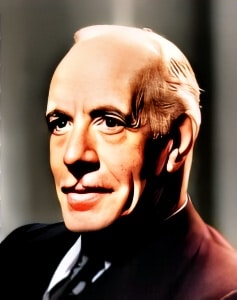 Lewis Stone, a distinguished American actor, left an indelible mark on the early years of American cinema.
Lewis Stone, a distinguished American actor, left an indelible mark on the early years of American cinema.
Born on November 15, 1879, in Worcester, Massachusetts, Stone’s career spanned the silent film era and transitioned into the sound film era, showcasing his remarkable versatility and acting prowess. While his name may not be as widely recognized today as some of his contemporaries, Lewis Stone’s contributions to film and entertainment remain celebrated for their enduring appeal.
Stone’s journey into the world of entertainment began when he joined a traveling theatrical company at a young age. His talent and presence on stage quickly garnered attention, and he transitioned to silent films, making his screen debut in 1915.
One of the defining moments in Lewis Stone’s career was his role in the 1921 silent film “The Four Horsemen of the Apocalypse.” Directed by Rex Ingram and based on the novel by Vicente Blasco Ibáñez, the film catapulted Stone to fame. He portrayed Marcelo Desnoyers, a complex character in a narrative that spans World War I and the social upheaval of Argentina. Stone’s ability to convey the depth of his character and the emotional turmoil of the era showcased his acting skills and left a lasting impression on audiences.
Stone’s versatility extended beyond his work in “The Four Horsemen of the Apocalypse.” He appeared in a wide range of silent films, encompassing various genres, from comedies to dramas. His filmography showcased his ability to engage with diverse characters and narratives, highlighting his adaptability and commitment to his craft.
Lewis Stone’s versatile career included a memorable role in the 1923 silent film “ Scaramouche.” Directed by Rex Ingram and based on Rafael Sabatini’s novel.
The transition from silent films to sound films marked a significant shift in the film industry, challenging many silent film actors to adapt to this new era. Lewis Stone successfully made the transition, underscoring his adaptability and commitment to his craft. His rich baritone voice and acting skills allowed him to continue his success in the sound era.
Throughout his career, Lewis Stone often portrayed fatherly and authoritative figures, earning him the moniker “The Father of Hollywood.” His dignified and reassuring presence on screen made him a popular choice for these roles in both silent and sound films. He starred in numerous films alongside iconic actors and actresses, leaving a memorable mark on the industry.
In addition to his acting career, Stone was known for his philanthropic efforts and his advocacy for various charitable causes. He used his fame to support organizations and initiatives that sought to make a positive impact on society.
In conclusion, Lewis Stone was a versatile and celebrated American actor who made a lasting impact on the early years of American cinema. His ability to adapt to the transition from silent films to sound films showcased his versatility and commitment to his craft. While his name may not be as widely recognized today as some of the leading actors of his time, his performances and his enduring influence on the industry remain a valuable part of the history of early Hollywood. Lewis Stone’s legacy continues to inspire future generations of actors and filmmakers, serving as an integral part of the early days of the film industry.
Loading live eBay listings...




